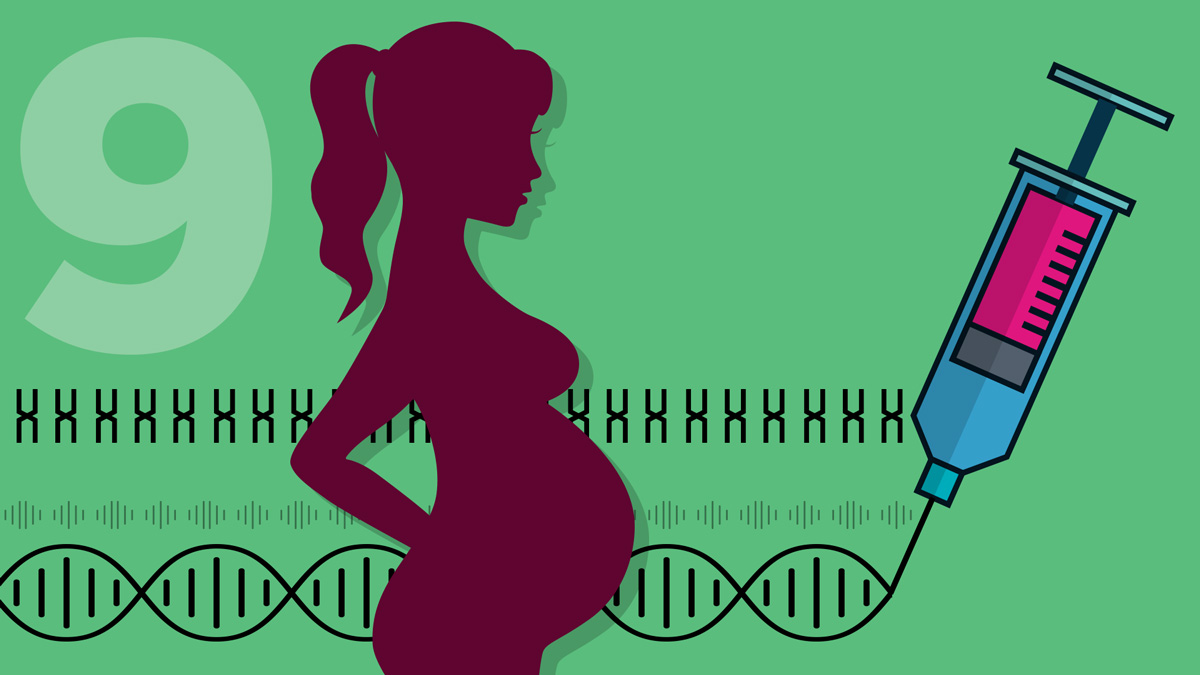Ensuring the Best for Your Little One
Apr 19, 2023
1591 Views
Congratulations to you and your partner on your upcoming bundle of joy!
As expectant parents, there are many things you can do to help ensure the best possible outcome for your little one. One important aspect of prenatal care is genetic testing, which can provide valuable information about your baby’s health and development. In this guide, we’ll explore the various types of genetic screening and diagnostic testing available to you as parents, as well as their benefits and limitations. Whether you are a first-time parent or an experienced pro, we hope this information will help you feel more confident and prepared as you navigate this exciting new chapter in your lives. So sit back, relax and let’s dive into the world of prenatal genetic care!
Understanding Prenatal Genetic Screening & Diagnostic Testing:
When you are pregnant, you want to make sure your little one is growing healthy and happy. Prenatal genetic testing can help with that! However, all genetic testing is optional. Talk with your doctor or a genetic counselor and decide which tests are right for you.
- Prenatal genetic screening checks for the possibility of certain genetic conditions through simple and routine blood tests or via ultrasound scans of the expecting mother.
- Prenatal genetic diagnostic testing involves analyzing the DNA of the growing baby to diagnose or rule out specific genetic conditions. This type of testing, sometimes referred to as invasive testing, requires a sample of the amniotic fluid or placental tissue through a specialized procedure called amniocentesis or chorionic villus sampling (CVS).
Both types of tests help parents-to-be to understand their growing baby’s health and make informed decisions about their pregnancy.

Am I Really Pregnant? The First Test You Should Take!
You‘re pregnant! Woohoo! After that first positive pregnancy test, the next step is a scan to confirm the news and check on your little one. This usually happens around 4-8 weeks into your pregnancy and involves a transvaginal ultrasound to see your baby‘s heartbeat and check their position. It‘s an exciting moment, and a sign of all the amazing things to come! An ultrasound scan (USG) is a medical tool that uses sound waves to create pictures of your growing baby inside your tummy. It is super helpful for pregnant parents because it can show how your baby is growing, help estimate the due date, plus provides a clear picture of the baby’s organs, bones and measurements. If a USG picks up any abnormality, your doctor will take a closer look and may suggest follow-up diagnostic testing or consultations with a specialist, like a fetal medicine specialist or a genetic counselor.
Genetic Screening:
Screening tests don’t diagnose genetic conditions, and an abnormal result doesn’t mean the baby has a condition. It means there’s a higher risk for a genetic disorder. Some examples of the screening tests that a mom-to-be might go through during her pregnancy:
Combined First Trimester Screening (NT scan and Double Marker): This test is performed between 11-13.6 weeks. This test measures the biochemical estimation of two main parameters which are pregnancy-associated plasma protein-A (PAPP-A) and Beta HCG, along with an ultrasound examination of Nuchal Translucency (NT).
Quadruple marker Test: As the name suggests it looks for four biomarkers and can help the doctor to estimate the risk for chromosomal aneuploidies (Trisomy 13, 18, 21), and Neural Tube defects (NTD).
Non-Invasive Prenatal Screening (NIPS): It is a simple blood test that a pregnant woman can undergo from the 10th week of pregnancy. The great thing about NIPS is that it’s very accurate - for example, it has a sensitivity and specificity of over 99% for detecting Trisomy 21 or Down syndrome which is a condition where the baby has an extra chromosome 21. It is also quite good at detecting Trisomy 13 and 18, which are other chromosomal abnormalities. However for sex chromosomes, the accuracy is a bit lower, around 85- 87%.
Okay I’ve undergone the biochemical screening tests and NIPS. Are these biochemical tests enough?
Not yet! One of the most important ultrasound testing which is done between 18-23 weeks of gestation is called Targeted Imaging For Fetal Anomalies or TIFFA scan for short. Every pregnant woman undergoes a detailed head-to-toe examination of her baby around the 18th week. Doctors check for structural abnormality in a baby using an ultrasound. It can detect congenital anomalies like clubfoot, cleft lip and palate, movement of the baby, etc.
Genetic diagnostic testing:
Now that we have looked at the screening tests, let‘s talk further about genetic diagnostic testing! So you’ve gone through your screening tests and the results have come back abnormal. No need to worry just yet! Your doctor will take a closer look at your ultrasound scans to determine if further diagnostic testing is necessary. This type of testing involves some specialized procedures like amniocentesis or chorionic villus sampling (CVS). Diagnostic prenatal tests can confirm if the baby has a genetic condition.
CVS is usually done between 11-13 weeks of pregnancy whereas amniocentesis is carried out between >15weeks - 18 weeks of pregnancy. In CVS, a small sample of cells is taken from the placenta (the organ that connects the baby’s blood supply to the mother’s). Amniocentesis involves taking a sample of the amniotic fluid that surrounds the baby in the uterus. Both CVS and amniocentesis are invasive procedures, meaning there is a small, usually <1% risk of miscarriage associated with them. Once your doctor has collected your baby’s sample, they will proceed to send it to a genetic laboratory for appropriate genetic diagnostic testing to get a clearer picture of your baby’s health. Some diagnostic test results can be ready in 72 hours, while others may take more than 2-3 weeks to complete.
Now lets look briefly at some of the different types of genetic diagnostic testing available.
Karyotype: This is like taking a picture of a person’s chromosomes. This test can show if there’s any problems with the structure or number of the chromosomes (any extra or missing pieces) that could cause problems, for example Down syndrome or Trisomy 21. Karyotype gives visual information regarding all the 46 human chromosomes.
Chromosomal microarray (CMA): CMA testing is like taking a high-resolution picture of a person’s chromosomes. This test can detect very small pieces of missing or extra genetic material that might not be visible on a karyotype, for example DiGeorge syndrome. It can identify genetic conditions that can cause developmental delays, intellectual disabilities and birth defects even if they are not visible through other tests. CMA provides a detailed, in-depth analysis of all 46 human chromosomes.
Exome sequencing: Exome sequencing is like reading through in detail about the code in a person’s DNA. This test can look at hundreds of genes at a time. It is like reading through a book word-by-word to make sure everything is spelled correctly. It can show if there are any errors or mutations in your baby’s DNA or genes. Mutations in a person’s genes can also lead to genetic disorders, like Thalassemia which is a common blood disorder. Such mutations are not visible on a karyotype or a CMA test.
Sanger sequencing: This is quite similar to exome sequencing, however while exome sequencing looks at multiple genes at a time, sanger sequencing looks at one gene at a time. This method can be used to check for known mutations in a specific gene, this is especially useful if there’s already a history of a known genetic mutation in the family.

How Can Parents-To-Be Approach Genetic Screening and Diagnostic Testing?
Deciding to undergo pregnancy screenings and diagnostic tests is a personal choice, and this decision ultimately rests with you and your partner. It‘s normal to have questions about which tests to get and what the results mean. It‘s important to ask questions and get the information you need to make the best decision for you and your family. Your doctor or a genetic counselor can provide guidance on the risks and benefits of each test and help you make an informed decision that is right for you. Ultimately, it‘s up to you and your loved ones to decide how to proceed if a genetic test reveals something concerning. Keep in mind that the vast majority of babies are born healthy, but it’s still important to be aware of your options and the genetic tests that are at your disposal. To quote author Linda Wooten - Being a mother is learning about strengths you didn‘t know you had, and dealing with fears you didn‘t know existed!
